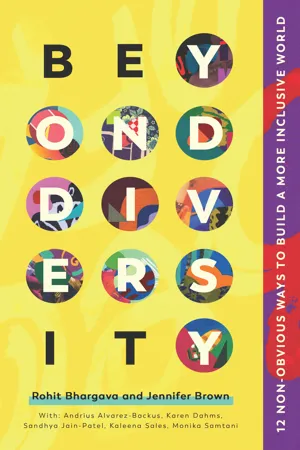
Beyond Diversity
12 Non-Obvious Ways To Build A More Inclusive World
- English
- ePUB (mobile friendly)
- Available on iOS & Android
About this book
"A useful, forcefully written, and wide-ranging study of inequities—and how to fix them." — Kirkus Reviews
What if we could go beyond the conversation about diversity and take real action?
In early 2021, more than two hundred widely respected experts gathered virtually for the world's most ambitious conversation about diversity. Our aim was to do more than spotlight injustice. We challenged ourselves to imagine how to fix it. The dialogue brought together casting directors, bookstore owners, disabled leaders, healthcare professionals, students, VCs, standup comedians, chief diversity officers, pro gamers, archaeologists, government insiders, startup founders, and even a master puppeteer.
Now for the first time, these solutions are compiled into one groundbreaking volume organized into twelve powerful themes including: storytelling, technology, identity, retail, education and more. Each chapter paints a revealing picture of the world, how it is, how it could be and what needs to happen for us to get there. For newcomers to the topic of diversity, and DEI experts alike, this book offers a much-needed actionable blueprint for creating a more inclusive world for us all.
Frequently asked questions
- Essential is ideal for learners and professionals who enjoy exploring a wide range of subjects. Access the Essential Library with 800,000+ trusted titles and best-sellers across business, personal growth, and the humanities. Includes unlimited reading time and Standard Read Aloud voice.
- Complete: Perfect for advanced learners and researchers needing full, unrestricted access. Unlock 1.4M+ books across hundreds of subjects, including academic and specialized titles. The Complete Plan also includes advanced features like Premium Read Aloud and Research Assistant.
Please note we cannot support devices running on iOS 13 and Android 7 or earlier. Learn more about using the app.
Information
Beyond Diversity … The 12 Themes

1
BEYOND DIVERSITY IN
STORYTELLING

“‘Diversity’ should just be called ‘reality.’ Your books, your TV shows, your movies, your articles, your curricula, need to reflect reality.”— Tananarive Due, Author and American Book Award winner
Chapter Summary:
How It Is …
Table of contents
- Cover
- Advance Praise:
- Copyright Page
- Title Page
- Dedication
- Contents
- Authors’ Note
- Contributors
- Introduction
- Beyond Diversity …
- Conclusion
- Acknowledgments
- Appendix: Terminology
- About the Artist: Zharia Shinn
- Endnotes
- Index